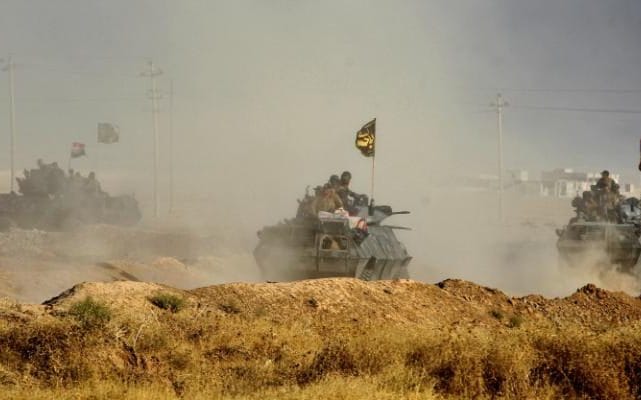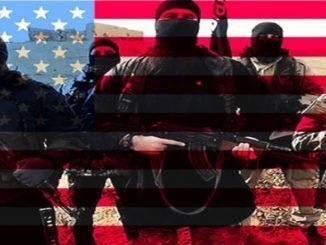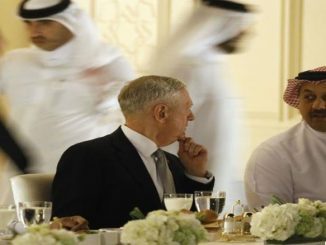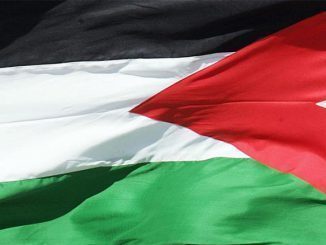
A much-anticipated Mosul offensive to liberate the city from Daesh began midnight Sunday, according to Iraqi Prime Minister Haider al-Abadi, reported Anadolu Agency.
In an address on state television, Abadi said only the Iraqi army and police would be in the city. He called on people in Mosul to be in solidarity with the security forces.
It was reported earlier that the Iraqi army was gradually advancing toward Mosul, which officials in Baghdad vowed to liberate by the end of the year.
Turkey Will ‘be at table’ for Mosul Talks: Erdogan
Turkish President Recep Tayyip Erdogan said Monday Turkey would not only participate in the ongoing Mosul operation against Daesh in Iraq but would also “be at the table for talks”.
“It is impossible for us to stay out of it because there lies history for us,” said Erdogan.
The Turkish president spoke in Istanbul during an international legal congress and told listeners Ankara was “not responsible for the results of an operation that it does not participate in”.
Erdogan also said the “brothers of Turkey” — Arabs, Turkmens and Kurdish civilians — were currently in Mosul.
Referring to a Turkish-manned military facility close to Mosul, Erdogan said: “Nobody can expect us to leave Bashiqa.”
“We trained Iraqi soldiers in Bashiqa camp, as well as peshmerga for them to fight against Daesh,” Erdogan said. “If these fighters had not been there, there would not have been a decent troop to fight.”
Erdogan also warned about the possibility of sectarian violence: “The insistence that Turkey be left out of the Mosul operation is because we would prevent a sectarian conflict there.”
Turkish officials previously referred to troops going to Mosul to prevent any potential sectarian conflict in and around the city after it is taken from Daesh.
“We cannot say ‘yes’ to a Sunni-Shia conflict,” Erdogan said.
In mid-2014, Daesh took Mosul and overran vast swathes of territory in northern and western Iraq.
US, Turkey’s top commanders discuss Iraq, Syria
The U.S.’s top general met Turkey’s Chief of General Staff Hulusi Akar at the Turkish embassy in Washington on Sunday to discuss recent regional developments, including the operation to free Mosul, Iraq, from Daesh.
Akar is in Washington for joining a counter-Daesh coalition meeting that kicks off on Monday at Andrews Air Force Base in Maryland.
In a nearly two-hour meeting, the two top commanders reportedly discussed a range of issues, including Turkish military operations in Syria and the Mosul operation.
The meeting between Gen. Joseph Dunford and Akar was held in on the heels of an operation by Turkish-backed Syrian rebels that recaptured the city of Dabiq, a Daesh stronghold in northern Syria.
A key agenda point during the meeting, according to Turkish military sources, was the operation to retake Mosul from Daesh.
General Akar underscored Turkey’s concerns about refugee flow and sectarian feuds that might rock the city after Daesh fighters are removed.
Turkey has expressed concerns about a sectarian attitude toward the predominantly Sunni population in Mosul.
Recent months have seen the Iraqi army, backed by a 60-nation air coalition led by the U.S. retake a large portion of the territory. Nevertheless, the terrorist group remains in control of several parts of the country, including Mosul.
30,000 Troops Push in on Mosul from 3 Sides: The Telegraph
Also according to The Telegraph, the Iraqi army has begun the “mother of all battles” to liberate the city of Mosul from Isis, in the hope of dislodging them from their last major stronghold in the country after Haider al-Abadi, the Iraqi Prime Minister, announced the offensive on state television.
The offensive is a joint operation by more than 30,000 troops from the Iraqi army, Kurdish Peshmerga and a Shia paramilitary force, which are pushing in on the city from three sides, reported The Telegraph .
Some 8,000 jihadists have dug in in Mosul, which has been under Isis’s control since the militants swept through northern Iraq in a blitzkrieg in the summer of 2014.
The city is important to the group both strategically, for its proximity to its territory in neighbouring Syria and to its supply route through Turkey, and also symbolically.
Some pictures are now coming in from east of Mosul, where a car bomb has exploded. The Iraqi military says heavy losses have been inflicted on Isil and advances made in the south-east.
“The start of Iraqi operations to retake the city of Mosul marks another step forward towards clearing Daesh from Iraq.
“After two years of brutal rule, the people of Mosul can start to have hope for a better future.
“This will be the greatest challenge that Iraq’s Security Forces have yet encountered – they are up to that challenge. The UK, as part of the Global Coalition, is committed to continuing to provide the government of Iraq with military, humanitarian and stabilisation support.”
‘This is a decisive moment’ – US Secretary of Defense
In Washington, Defence Secretary Ash Carter called the launch of the Mosul operation “a decisive moment in the campaign” to deliver a lasting defeat to IS.
Iraqi forces have been massing around the city in recent days, including elite special forces that are expected to lead the charge into the city, as well as Kurdish forces, Sunni tribal fighters, federal police and Shiite militia forces.
South of Mosul, Iraqi military units are based at the sprawling Qayara air base, but to the city’s east, men are camped out in abandoned homes as the tens of thousands of troops massed around the city have overwhelmed the few military bases in the area.
Kurdish forces are stationed to the north and east of Mosul, a mostly Sunni city that has long been a center of insurgent activity and anti-central government sentiment after the U.S.-led invasion of Iraq in 2003.
Iraqi officials have warned that the Mosul operation has been rushed before a political agreement has been set for how the city will be governed after IS.
Lt. Col. Amozhgar Taher with Iraq’s Kurdish forces, also known as the peshmerga, said his men would only move to retake a cluster of mostly Christian and Shabak villages east of Mosul and would not enter the city itself due to their concern for “sectarian sensitivities.” Taher spoke at a makeshift base in an abandoned house along the front line, some 30 kilometers (19 miles) east of Mosul.
British charity prepares to send aid to Mosul
Aid agencies are now in a race against time to get supplies and medical assistance to Mosul.
Among them is the British charity Shelterbox, which builds basic housing facilities for those displaced by conflict or natural disasters.
Shelterbox’s Rachel Harvey, who is based in Erbil, said: “The aim is to get aid to displaced families as quickly as possible. So we are prepositioning stock close to places where we think they might arrive.
“They are likely to be exhausted and traumatised by their recent experiences. Giving people shelter and essential items such as a solar lamp, blankets and a water carrier will allow them a degree of dignity and security to rest and recover.’
More than a million civilians in Mosul facing ‘impossible decision’
More than one million people, including hundreds of thousands of children, are facing an “impossible decision” as a huge military assault is launched in Iraq against Islamic State (IS) fighters, reports the Press Association.
Coalition forces are backing local government and Kurdish military with air strikes in an attempt to take Mosul, the country’s second largest city, back from IS rule.
Safe escape routes out of the city for civilians caught up in the bloody conflict “do not exist”, Save the Children has warned.
Families and children have been advised by local forces to stay inside and erect a white flag on their homes in a bid to stay safe, the charity’s spokesman, Ruairidh Villar, said.
Speaking from Irbil, he told the Press Association: “Whether families and children stay or they flee, right now it’s an impossible decision.”
Save the Children, which said humanitarian agencies are able to get no closer than 30 miles (48km) to the city, is calling on people to urge the Government to do what it can to ensure there are safe pathways for people to leave the area.
He said: “We are calling on the UK Government to put pressure on the Iraqi and coalition forces around Mosul now to establish safe corridors, safe escape routes for children to get out.”
Children in Mosul, which has been under IS control for two years, face further trauma amid the bombardment of the city, Mr Villar said.
“These children have been through two years of IS rule, subject to an education which is focused on extremist violence,” he said, adding that much planning has gone into military operations but not necessarily the humanitarian fallout.
“Some children have not gone to school at all. There’s been a lack of food and medicine and after all that they’re going to have to escape from what looks to be a very bloody conflict indeed.”
The charity said the UN’s emergency appeal is not well enough funded, meaning camps only ready to house around 60,000 people could be “overwhelmed within days”.
Iraqi military, Kurdish, and US forces move towards eastern and southern Mosul in a bid to reclaim the city from Islamic State.
3,000 Iraqi soldiers trained by Turkey in bid to drive Isil from Mosul
Around half of some 3,000 Iraqi forces trained by Turkey at the Bashiqa camp in northern Iraq are taking part in the operation to drive Islamic State from the city of Mosul, Turkish military sources have told Reuters.
Turkey has been locked in a row with Iraq’s central government over the presence of Turkish troops at Bashiqa and over who should take part in the U.S.-backed assault on Mosul.
“Around half of the 3,000 are currently taking part in the operation. The other half are being kept in reserve,” one of the sources told Reuters.
But according to Anadolu Agency, around 2,000 Turkey-trained fighters joined Mosul offensive.
Turkish-trained forces are participating in the military operation to recapture Iraq’s northern city of Mosul from Daesh terrorist organization, the former Mosul governor said Monday, reported Anadolu Agency.
Atheel Nujaifi, who is also the commander of Nineveh Guards, which were trained by Turkey in Bashiqa camp, said some 2,000 Sunni fighters have joined the offensive and they were acting with the Kurdish peshmerga forces.
Three villages already liberated by Peshmerga forces
Lt. Gen. Stephen Townsend, commander of Combined Joint Task Force Operation Inherent Resolve, says the U.S.-led coalition is providing wide support for the Iraqi and Kurdish forces in the battle for Mosul.
But he stressed, “to be clear, the thousands of ground combat forces who will liberate Mosul are all Iraqis.”
Townsend’s statement came shortly after Iraqi Prime Minister Haider al-Abadi announced the start of operations on Monday to liberate the northern city of Mosul from Islamic State militants.
The U.S. commander pledged the coalition will continue to use “precision to accurately attack the enemy and to minimize any impact on innocent civilians.”
He says: “This may prove to be a long and tough battle, but the Iraqis have prepared for it and we will stand by them.”
Dark clouds over Isil stronghold
Iraq’s military and the country’s Kurdish forces are on the move to the south and east of the Islamic State group-held city of Mosul.
The early Monday morning development follows Iraqi Prime Minister Haider al-Abadi’s announcement that the long-awaited fight to retake Mosul has begun.
Convoys of Iraqi, Kurdish and U.S. forces could be seen moving east of Mosul into the early hours of Monday. Along the front line, U.S.-led coalition airstrikes sent plumes of smokes into the air and heavy artillery rounds could be heard.
Mosul, Iraq’s second largest city, has been under IS rule for more than two years and still home to more than a million civilians according to estimates from the United Nations. The fight is expected to be the most complex yet for Iraq’s military.
Peshmerga forces now stand just 7 kilometers (4 miles) east of Mosul, while Iraqi army forces have started penetrating the Al-Kuwer area southeast of the city, military sources told Anadolu Agency Monday.
The latest developments come within the context of a broad Iraqi army operation — which kicked off early Monday — to clear the beleaguered city of members of the Daesh terrorist group.
Peshmerga forces, which are now deployed along the Al-Kazir axis east of Mosul, began their advance dawn Monday, capturing eight villages on the city’s outskirts, according to Mustafa Sarhank, a Peshmerga major.
“The advance is continuing; we are now near the intersection of the Al-Hamdaniya district some seven kilometers east of Mosul,” Sarhank told Anadolu Agency.
The captured villages are located along the road linking the cities of Mosul and Erbil, Sarhank said, adding that Daesh militants had torched several oil wells in Al-Hamdaniya as they retreated before the onslaught.
An international anti-Daesh air coalition led by the U.S., he added, had continued to strike Daesh positions along the Al-Khazir axis.
Meanwhile, the Iraqi army’s Ninth Armored Division has penetrated the Al-Kuwer area from two axes amid ongoing clashes with Daesh militants, Yassin al-Nuaimi, a first lieutenant in the division, said.
He went on to predict that the operation to retake Al-Kuwer would take “some time”, noting that terrorist elements had mined and booby-trapped roads, buildings and sites in the area while deploying snipers in strategic parts of the city’s outskirts.
Al-Nuaimi also pointed out that, as of 1 p.m. (1000 GMT), U.S.-led coalition warplanes had not participated in the operation to capture Al-Kuwer.
In some of the first reports of casualties, five Kurdish Peshmerga fighters were killed by a suicide car-bomb — and ten others injured — east of Mosul, a Peshmerga officer told Anadolu Agency.
The source, who spoke anonymously due to restrictions on talking to media, said the son of the vice-president of northern Iraq’s semi-autonomous Kurdish Regional Government had been among those injured.
Meanwhile, four Iraqi soldiers were killed while fighting Daesh south of Mosul, according to an Iraqi military source, who said advancing troops were encountering fierce resistance by the terrorist group.
A senior U.S. general on Monday also said the battle to oust Daesh from its stronghold in Iraq “will likely continue for weeks, possibly longer”.
“We can’t predict how long it will take for the Iraqi security forces to defeat Daesh in Mosul; but we know they will succeed, just as they did in Bayji, in Ramadi, in Fallujah and, more recently in Qayyarah and Sharqat,” anti-Daesh coalition commanding Lt. Gen. Stephen J. Townsend said in a pre-recorded video message.
The U.S.-led coalition is supporting Iraqi forces with “air support, artillery, intelligence, advisers and forward air controllers,” according to Townsend. “This may prove to be a long and tough battle, but the Iraqis have prepared for it and we will stand by them,” he said.
The offensive is likely to be complicated by Daesh’s use of “deeply unethical and dangerous tactics to try to hold on to that city,” the White House said.
“This is an important operation, but one that we anticipate is going to take some time given how significant the city is both strategically and symbolically, how large the city is, and how long ISIL has had to dig in and fortify their defenses in that city,” spokesman Josh Earnest told reporters.
He stressed that the U.S. is mindful of ensuring that the operation is “consistent with the need to look out for basic universal human rights and to ensure that these operations are not being used as a cover to carry out retribution against other religious groups”.
Early Monday morning, Iraqi Prime Minister Haider al-Abadi announced the launch of a much-anticipated army operation to “liberate” Mosul from Daesh, which overran the northern city — along with many other parts of Iraq — over two years ago.
In a statement, the Kurdish Regional Government’s Peshmerga Ministry announced that at roughly 6:00 a.m. Monday, a “large-scale, coordinated operation was launched by Peshmerga forces in Al-Khazir east of Mosul while Iraqi security forces mobilized from Al-Kuwer and Al-Qayyarah south of Mosul”.
The twin moves, the statement added, constituted “a first step toward clearing Nineveh province [of which Mosul is the regional capital] of Daesh terrorists”.
Masoud Barzani, the president of the Kurdish Regional Government in northern Iraq, said Kurdish Peshmerga forces had taken more than 200 square kilometers (80 square miles) from Daesh as they advanced from the east of Mosul. (approximately at 19:30 on Monday)
Speaking at a news conference near the city, Barzani said the gains were a “turning point in the war against terrorism” and the first time the Peshmerga and Iraqi army had cooperated in the same area.
“We are hopeful that this operation will be successful and that Mosul will be liberated,” he added. “But this does not mean that the terrorist threat is over.”
He also called for the government in Baghdad and Turkey to “reach a consensus” over Turkey’s role in supporting the Mosul operation.
Along with Iraqi army and federal police personnel, Peshmerga forces, the Hashd al-Shaabi (pro-government Shia militiamen), the Hashd al-Watani (mainly Sunni pro-government militiamen), and the U.S.-led coalition are taking part in the campaign.
In mid-2014, Daesh captured Mosul, Iraq’s second largest city, before overrunning vast swathes of territory in the country’s north and west.
Recent months have seen the Iraqi army, backed by local allies on the ground and the U.S.-led air coalition, retake much territory. Nevertheless, the terrorist group remains in control of several parts of the country, including Mosul.
In recent weeks, the army and its allies have staged a gradual advance on the city, which officials in Baghdad have vowed to “liberate” by year’s end.
Amnesty: Sunnis Facing Brutal Revenge Attacks from the Shiite Militias in Mosul
Amnesty International accused – in a recent report on Tuesday, Oct. 18 – the Shi’a militias, known as the Popular Mobilization Units, as well as Iraqi government forces of committing “serious human rights violations, including war crimes, by torturing, arbitrarily detaining, forcibly disappearing and extrajudicially executing thousands of civilians who have escaped areas controlled by the armed group calling itself the Islamic State (IS).” These violations and acts of revenge were committed by the Shi’a militias and the Iraqi government forces during the battle to retake Mosul froMosulAm ISIS early Monday, reported CNN Arabic.
“After escaping the horrors of war and tyranny of IS, Sunni Arabs in Iraq are facing brutal revenge attacks at the hands of militias and government forces, and are being punished for crimes committed by the group,” said Philip Luther, Research and Advocacy Director for the Middle East and North Africa at Amnesty International.
“Iraq is currently facing very real and deadly security threats from IS, but there can be no justification for extrajudicial executions, enforced disappearances, torture or arbitrary detention.
“As the battle to retake Mosul gets underway, it is crucial that the Iraqi authorities take steps to ensure these appalling abuses do not happen again. States supporting military efforts to combat IS in Iraq must demonstrate they will not continue to turn a blind eye to violations,” said the Amnesty report.



